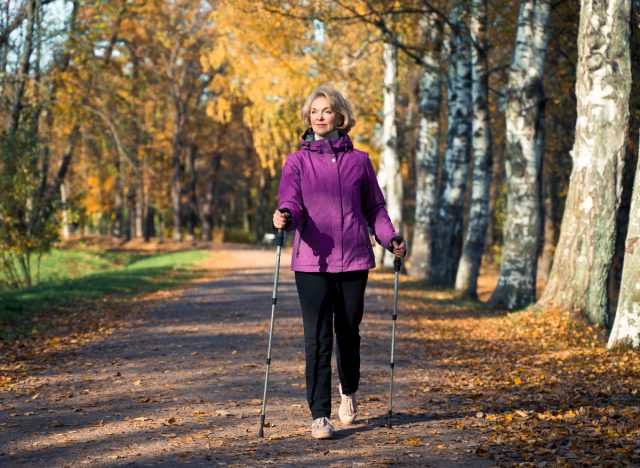Walking has been a long-time favorite low-impact exercise for fitness and wellness enthusiasts alike. This simple form of cardio offers plenty of health benefits without placing undue stress on your joints. Plus, walking is easy on your wallet—all you need is a good pair of walking shoes and a solid route to do it! However, more recently, people have been ditching regular walks for “Nordic walking,” an invigorating total-body workout with roots in the Scandinavian countries.
You may wonder why people are swapping out their daily strolls for this intriguing variation. We did the digging on social media and chatted with an expert who explains everything you need to know about Nordic walking.
What Is Nordic Walking?


Grab your walking poles and get ready to hit the trails for a dynamic total-body workout.
“Nordic walking is a full-body exercise that involves walking with specially designed poles (they look like ski poles),” explains April Gatlin, senior master trainer for STRIDE Fitness. “This is a great way to walk and involve the upper body more in the exercise.”
So the secret’s out—by engaging in Nordic walking, you’ll incorporate poles to fire up your legs and upper body while boosting your endurance, strength, and overall fitness. Nordic walking is a stellar way to maximize the benefits of a good old-fashioned walk. And the best part? The sport may not feel much more challenging.
Sounds like a win-win to us!
The Benefits of Nordic Walking
Whether you enjoy hiking or simply want to jazz up your cardio routine, Nordic walking sounds incredibly enticing. Let’s explore its incredible benefits.
1. It speeds up calorie burn.
Those who want to shed excess pounds may want to consider Nordic walking. “By involving more muscle groups, Nordic walking can help burn more calories [than] standard walking,” Gatlin tells us. “It can be especially effective for weight management or weight loss.”
2. It enhances your cardiovascular fitness.
By using walking poles, you work both your lower and upper body, which can increase your heart rate. “Due to more muscle recruitment, Nordic walking elevates the heart rate, which can improve cardiovascular endurance and overall heart health,” Gatlin confirms.
3. It boosts muscle tone and strength.
In addition to giving your cardiovascular fitness a nice little boost, using walking poles also enhances muscle tone and strength. “The poles help build and tone muscles in both the upper and lower body, contributing to overall strength and muscle balance,” Gatlin says.
4. It’s low-impact.
Walking is a low-impact form of physical activity, but incorporating walking poles offers additional support and further decreases the impact on your knees, lower back, and hips. “[Nordic walking is] a gentler option for those with joint issues or arthritis,” Gatlin points out.
5. It improves your mental wellness.
TikTok user Mindful Growth encourages you to try Nordic walking to improve your mental and physical wellness.
She explains in a video, “If you are worried about cognitive decline or just generally want to keep your brain healthy, every single day, you should be engaging your walking muscles, your brain power muscles, and your grip strength … there have been so many studies on Nordic walking and its effect on overall physical health; it’s also a predictor of cognitive decline.”
In fact, one study published in Heliyon showed that Nordic walking could improve cognitive function in individuals with Alzheimer’s.
How Is Nordic Walking More Beneficial Than Going on a Classic Walk?


Nordic walking calls for more “intention” than if you were to take a classic walk. “A person has to intentionally place the pole [and] drive with the arms while walking all at the same time,” Gatlin explains. “Coordination is being used, which has anti-aging benefits.”
In addition, Nordic walking is an excellent option for the older demographic. By incorporating walking poles, it helps them feel more comfortable and stable.









